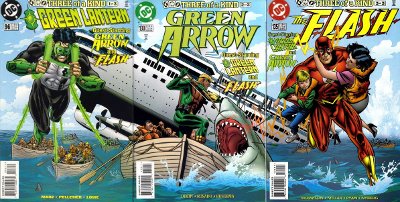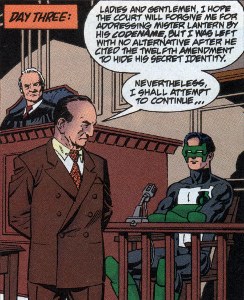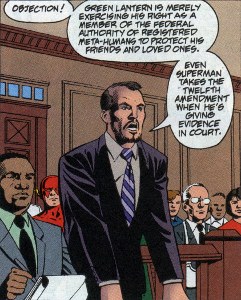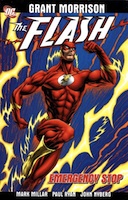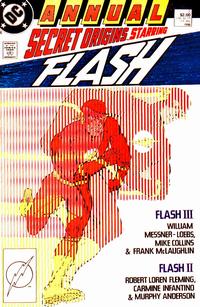 Back in February, DC’s Executive Editor Dan Didio stated that one of the reasons they are bringing back Barry Allen as the primary Flash is because “you can’t tell the origin of Wally West without Barry Allen.” I have to agree with Comics Should Be Good that this isn’t a valid reason. It doesn’t take that much more time to explain Barry’s involvement in Wally West’s origin.
Back in February, DC’s Executive Editor Dan Didio stated that one of the reasons they are bringing back Barry Allen as the primary Flash is because “you can’t tell the origin of Wally West without Barry Allen.” I have to agree with Comics Should Be Good that this isn’t a valid reason. It doesn’t take that much more time to explain Barry’s involvement in Wally West’s origin.
I had the same problem with complaints that Bart Allen’s origin was too complicated.
The origins are only complicated because we, as fans, want to include every little detail.*
Up to Speed
When it comes down to it, all you really need to explain the Flash — any Flash — is that he’s really, really fast, and he helps people (as Marc Guggenheim pointed out in his brief run on Flash: The Fastest Man Alive).
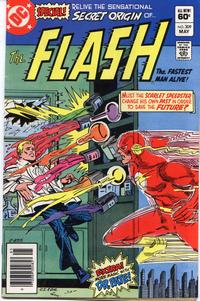 How about an origin? For Jay Garrick, Barry Allen and Wally West, the key element is: “A laboratory accident gave him super-speed.” You can get a little more specific if you like, say, “Gained super-speed after being struck by lightning and splashed with chemicals.” As for Bart Allen? “Inherited super-speed from his grandfather” — kind of like Zatanna, who inherited her magic from her parents, but I don’t think I’ve ever heard anyone complain that her origin is too complicated.
How about an origin? For Jay Garrick, Barry Allen and Wally West, the key element is: “A laboratory accident gave him super-speed.” You can get a little more specific if you like, say, “Gained super-speed after being struck by lightning and splashed with chemicals.” As for Bart Allen? “Inherited super-speed from his grandfather” — kind of like Zatanna, who inherited her magic from her parents, but I don’t think I’ve ever heard anyone complain that her origin is too complicated.
Sure, you can go into all the time-travel and accelerated aging for Bart, but you don’t need that for the sales pitch. It might help explain his personality during his years as Impulse, but even then, all you have to add is, “He was raised in virtual reality and has no concept of danger.”
Of course, if you’re going to tell a 7-part, 150-page epic Secret Origin story, I think there’s plenty room to cover a mentorship with a classic hero.
Mentors
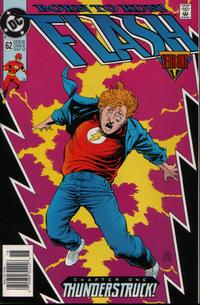 Now, if you’re going to do a Wally West story that really focuses on the fact that Barry Allen was his idol, his uncle, and his mentor, then yeah, you need to explain that relationship. But for the typical Flash vs. some Rogue story, the reader doesn’t need that level of detail. It’s enough to know that he trained under the previous Flash and later succeeded him. Kind of like how Hal Jordan trained under another Green Lantern (Sinestro), and succeeded a third Green Lantern (Abin Sur). Not only does the training under Sinestro seem to factor into most retellings of Hal’s origin, but the history between Hal and Sinestro seems to be extremely important to the current Green Lantern mythology.
Now, if you’re going to do a Wally West story that really focuses on the fact that Barry Allen was his idol, his uncle, and his mentor, then yeah, you need to explain that relationship. But for the typical Flash vs. some Rogue story, the reader doesn’t need that level of detail. It’s enough to know that he trained under the previous Flash and later succeeded him. Kind of like how Hal Jordan trained under another Green Lantern (Sinestro), and succeeded a third Green Lantern (Abin Sur). Not only does the training under Sinestro seem to factor into most retellings of Hal’s origin, but the history between Hal and Sinestro seems to be extremely important to the current Green Lantern mythology.
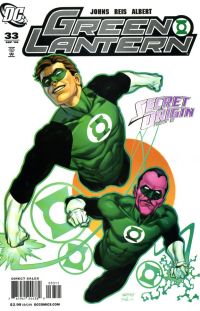 And yet I’ve never heard anyone claim that since you need to know Sinestro in order to know Hal Jordan’s origin, you might as well focus the Green Lantern series on Sinestro.
And yet I’ve never heard anyone claim that since you need to know Sinestro in order to know Hal Jordan’s origin, you might as well focus the Green Lantern series on Sinestro.
Or, for that matter, that since you need to know Obi-Wan Kenobi in order to understand how Luke Skywalker became a Jedi, then you really ought to focus on Obi-Wan instead of Luke. (Though given the current focus of the Star Wars franchise on the prequel era, perhaps that’s not the best example.)
Conclusion
So, is Barry Allen important to Wally West’s origin? Absolutely, no question about it. Does it make his origin more complicated? A little. Does it mean that DC can’t tell compelling, comprehensible stories about Wally West as the Flash? Of course not. Admittedly DC hasn’t been telling the best Flash stories possible lately, but having Barry in Wally’s background certainly didn’t stop them from telling good stories over the previous 20 years.
This is not to say that DC shouldn’t tell stories with Barry Allen instead of Wally West. Just that if they want to claim that it’s somehow necessary or better to focus on Barry, this particular rationale doesn’t hold up.
*Update: It’s not just comics fans, either. I once asked a family friend what Les Misérables was about, and she spent at least twenty minutes describing the plot of the three-hour stage version. And consider this tribute to “excruciatingly detailed” movie plot summaries on Wikipedia.) I don’t know if it’s our attention to detail, or our love of storytelling, but it’s just so easy to pile things on that a new reader doesn’t really need to worry about until a story warrants it.
(Thanks to comics.org for the cover scans.)

